The future of farming is female? About 36 percent of U.S. farmers are women, and 56 percent of all farms have at least one female decision maker, according to the 2017 Census of Agriculture. This number has continued to grow and demonstrates the important roles women play in the agriculture industry.
On the outside, it appears that women in agriculture are on the forefront of female equality and empowerment. They serve in leadership roles in their communities and even at the national level, seemingly breaking the glass ceiling females in other industries tend to get stuck under. Many women in agriculture believe the restrictions society claims women face are not actually issues for them — they feel equal to their male counterparts, and even welcome the difference in gender roles.
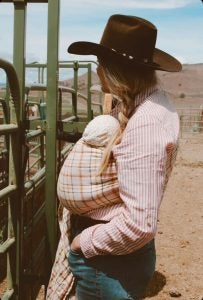
Some women feel blessed to be working alongside men and aren’t afraid of the fact that their strengths and skills are different from males.
Jordan Johnson is a ranchwoman and asked her social media audience some thought-provoking questions: “When do we stop shouting ‘I’m a woman, I’m a cowgirl, I’m a female! And just get to work?’ At what point are we going to ask for help when something is too heavy or too hard, and be okay with asking for help?”
Johnson goes on to embrace the unique differences in males and females and sees them as strengths. She simply wants women to embrace who they are, and just “let a gentleman get the gate for us.”
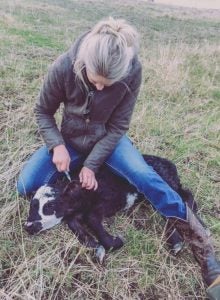
This is a popular school of thought among women in agriculture. They were brought up to appreciate what men and women can do to help each other and acknowledge that it’s important to have different skill sets. Women aren’t inferior to men; they are partners with them, and having to prove females can do the job is just part of the reward.
“I have learned that I have to prove myself to gain the same respect as men in my same profession, said Haley Ammann-Ekstrom, a rancher in Minnesota. “At first, I thought this was bad, but now I see that my customers would rather work with me versus a man because of how detail-oriented I am, I’m quick with results, and to deliver product, and I am genuine. Not many men exhibit these same qualities.”
On the flip side of this, though, is a huge disparity for women and a strong belief it needs to change. According to Farm Bureau members surveyed following the 2017 census, 91 percent said they believe more women should be in leadership roles within the agriculture community. However, that’s not the only issue needing to be fixed. Women have experienced disrespect and judgment from male counterparts and are becoming tired of feeling less-than.
Ammann-Ekstrom deals with this quite often, noting that even comments that have no ill intentions tend to make women in agriculture feel smaller, and afraid to be feminine while working in a man’s world, for fear they won’t be taken seriously.
“As a woman who grew up in the livestock industry, and works in an ag sales department, it’s subtle things like, ‘Do you need help lifting that?’ Or ‘You sell fuel and propane? Aren’t you afraid to ruin your manicure?’ “
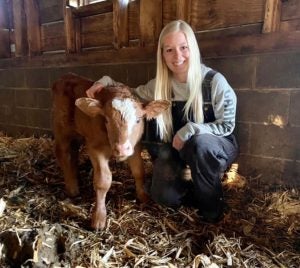
For other women, it also looks like missed opportunities, and one of the most prominent issues: Not being taken seriously in their respective roles.
Lauralee Doman has experienced this even as a high schooler. From losing out on ag jobs to men who had less experience than she did, to getting skipped over when it came to farm duties she wanted to learn.
“As a girl I feel like it is a fight for me to have my desires or knowledge taken seriously. Women have to work harder to find opportunities and mentors. I think, generally, women have to get out of their comfort zones more than men to be able to communicate effectively.”
Karlee Kay, who is in cattle genetics and breeding, said it took years for any male to take her seriously when she voiced an opinion or stated a fact, a common occurrence for women in many scenarios.
Another gap that may be noticed is the difference between female ag organizations versus those geared more toward co-ed membership.
Women-focused groups are great for bringing together talented and passionate women with similar interests and providing a purpose for those women to serve. However, for some women, it feels as though they only bring drama or don’t focus on serious industry matters.
Kacy Atkinson, a rancher in Wyoming, prefers co-ed groups.
“Women still haven’t learned how to get along, and it’s too much drama for me. I prefer the balance of co-ed; they are more productive, more fun, and just easier.”
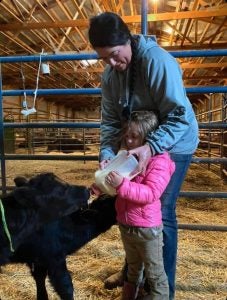
Carrie Sue Meeks, a Ph.D. candidate at Iowa State University, believes women-based ag groups often focus on “being a good advocating wife and more cute fluff.” She feels that these groups need a better balance of skills and knowledge, along with the fun stuff, to take back to their operations and succeed as women in the ag community.
Allyson Spears, host of the Ag Chicks podcast, wants more from her women organizations as well.
“I feel like sometimes women organizations focus too much on the feel-good stuff. If the cattlemen meeting has a session on feed prices, I want a session on feed prices at the women’s meeting too!”
Jordan Medlin, who works in finance, brings up the importance of bringing more women into male dominated groups.
“Involving more women helps to break up the ‘Good ‘Ol Boys’ clubs and brings younger people into the group. The younger generation must be involved to keep an organization alive.”
Of course, there are women who see the benefit of having female-facing ag organizations alongside more male-dominated groups.
Alyson Connolly, a member of both her local Cattlewomen and Cattlemen groups, understands why both exist.
“Our cattlewomen group does a fantastic job of reaching out to younger generations and doing beef lessons or interacting with the public. They also do great fundraisers and award scholarships whereas men can be intimidating to kids. However, the cattlemen group does a killer job of working on things for the betterment of our industry. I think both are necessary to be able to support the beef industry.”
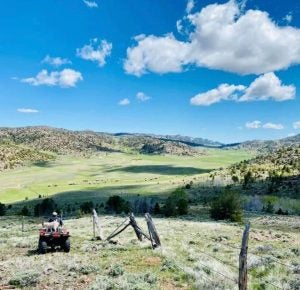
The reality for women in ag is that we all have different perspectives and experiences that have shaped our opinions on how women are treated within the industry. This isn’t just a result of treatment by men, but other women as well. There is no one-size-fits-all journey, and while many feel they are empowered in this space, there are just as many who feel they have been slighted.
There is no doubt that women have had to work hard to get to the positions and successes they have today, and we still have a way to go before we feel true representation in the ag industry.
Markie Hageman majored in agribusiness at Fort Hays State University. She is actively involved in her state Cattlemen’s Association, Young Farmers chapter, and National Cattlemen’s Beef Association. Her AGDAILY.com articles can be found here.



